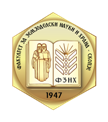MAGNESIUM CONTENT IN CAULIFLOWER AT SALES PLACES IN ZAGREB
Keywords:
Brassica oleracea var. botrytis, food, minerals, nutrients, vegetable.Abstract
Cauliflower (Brassica oleracea var. botrytis) is a biennial crop belonging to the mustard family. It is grown for a head consisting of a thick, short, hypertrophied flower stem with undifferentiated flowers and flower embryos. The minerals that are most abundant in cauliflower are sodium, potassium, magnesium, calcium, phosphorus, iron, and sulfur. Magnesium is an essential element for almost all living beings, it is involved in many processes such as the synthesis of organic substances, it is responsible for the activation of a large number of enzymes and has a beneficial effect on the metabolism of carbohydrates, proteins and fats. The aim of this article was to determine the content of magnesium in cauliflower available in the city of Zagreb and to determine how much magnesium can be settled by consuming that cauliflower. The sampling was carried out at 9 sales places in the city of Zagreb, of which 3 were stores with organic products, 3 markets and 3 retail chains. Magnesium was determined by atomic absorption spectrometry after digestion with concentrated HNO3 and HClO4 in a microwave oven. The magnesium content of cauliflower ranged from 0.17 to 0.22% Mg in dry matter, 21.24 to 38.87 mg Mg/100 g in the fresh matter, and it was found that consuming 100 g of cauliflower can satisfy 5.98-10.75% of our daily need for magnesium.



